The Relationship Between the Professional Skills of Cooperative Auditors and Auditor Responsibility
Main Article Content
Abstract
The purpose of this study was to examine the level of openions of the cooperative auditors in the case of professional skills and resonsibilities of the cooperative auditors and to study the relationship and effects of professional skills of the cooperative auditors including: 1) intellectual skills, 2) academic and practical skills; 3) personal skills, 4) interpersonal and communication skills, 5) organizational management and business management skills, and 6) professional ethics that have impacts on the audit responsibilities including 1) legal responsibility, 2) responsibility for the audit report, and 3) professional responsibility. By collecting data from cooperative auditors who are public servants of the audit department in the Northeastern region area during May, 2560, 217 people had received the questionnaire and 177 people replied, accounted for 81.57 %. Questionnaires were used as a research tool. Statistics used in data analysis are descriptive statistics, multivariate correlation analysis and multiple regression analysis. The results showed that cooperative auditors have opinion about overall professional skills and others were at high level with the highest ranking being Professional ethics and the second is personal skills and most comments agreed on all aspects of audit responsibilities. In addition, the test results on relationships and effects between Professional skills of the cooperative auditor and the audit responsibilities are as follows: 1) All Professional skills of auditors relate to the overall audit responsibilities and 2) Professional skills of the cooperative auditor in the area of interpersonal and communication skills and professional ethics have positive impacts on overall audit responsibilities. The results will help cooperative auditors and the units that are responsible for the potential development of the auditor to be able to use the information to develop training curricula to enhance their auditing skills and responsibilities in order to perform more effectively and efficiently in the future.
Article Details
บทความที่ได้รับการตีพิมพ์เป็นลิขสิทธิ์ของมหาวิทยาลัยเทคโนโลยีราชมงคลอีสาน
ข้อความที่ปรากฏในบทความแต่ละเรื่องในวารสารวิชาการเล่มนี้เป็นความคิดเห็นส่วนตัวของผู้เขียนแต่ละท่านไม่เกี่ยวข้องกับมหาวิทยาลัยเทคโนโลยีราชมงคลอีสานและคณาจารย์ท่านอื่นๆในมหาวิทยาลัยฯ แต่อย่างใด ความรับผิดชอบองค์ประกอบทั้งหมดของบทความแต่ละเรื่องเป็นของผู้เขียนแต่ละท่าน หากมีความผิดพลาดใดๆ ผู้เขียนแต่ละท่านจะรับผิดชอบบทความของตนเองแต่ผู้เดียว
References
กมลทิพย์ ศรีประไหม. (2558). ผลกระทบของความรับผิดชอบในการสอบบัญชีที่มีต่อคุณภาพการสอบบัญชีของผู้สอบบัญชีภาษีอากรในประเทศไทย. วิทยานิพนธ์ ปริญญาบัญชีมหาบัณฑิต. มหาสารคาม: มหาวิทยาลัยมหาสารคาม
จุฬาลักษณ์ นอนิล. (2557). ผลกระทบของความรับผิดชอบทางการสอบบัญชีที่ดีที่มีต่อความเชื่อถือของผู้มีส่วนเกี่ยวข้องของผู้สอบบัญชีรับอนุญาตในประเทศไทย. วิทยานิพนธ์ปริญญาบัญชีมหาบัณฑิต. มหาสารคาม: มหาวิทยาลัยมหาสารคาม
นิลุบล คงไมตรี. (2557). ความสัมพันธ์ระหว่างความรับผิดชอบทางบัญชีกับประสิทธิภาพการปฏิบัติงานของนักบัญชีองค์กรปกครองส่วนท้องถิ่นในจังหวัดกาฬสินธุ์. วิทยานิพนธ์ปริญญาบัญชีมหาบัณฑิต. มหาสารคาม: มหาวิทยาลัยมหาสารคาม
บุญชม ศรีสะอาด. (2545). การวิจัยเบื้องต้น. (พิมพ์ครั้งที่ 7). กรุงเทพมหานคร : สุวีริยาสาส์น
ปรีดา หาญพยัคฆ์. (2555). ผลกระทบของความรับผิดชอบทางการสอบบัญชีที่มีต่อคุณภาพการสอบบัญชีของผู้สอบบัญชีสหกรณ์. วิทยานิพนธ์ปริญญาบัญชีมหาบัณฑิต. มหาสารคาม: มหาวิทยาลัยมหาสารคาม
พรสุภา วสุนธรา. (2549). ความสัมพันธ์ระหว่างความสามารถในการเผชิญปัญหาและอุปสรรคกับความรับผิดชอบในงานของนักเขียนโปรแกรมคอมพิวเตอร์. วิทยานิพนธ์ ปริญญาศิลปะศาสตร์มหาบัณฑิต.กรุงเทพมหานคร: สถาบันเทคโนโลยีพระจอมเกล้าพระนครเหนือ
มงคล กิตติวุฒิไกร. (2557). ผลกระทบของการพัฒนาความรู้ทางการสอบบัญชีที่มีต่อความเป็นมืออาชีพของผู้สอบบัญชีรับอนุญาตในประเทศไทย. วิทยานิพนธ์ปริญญาบัญชีมหาบัณฑิต. มหาสารคาม: มหาวิทยาลัยมหาสารคาม
เมตตา บันลือหาญ. (2556). ความสัมพันธ์ระหว่างความรับผิดชอบในการปฏิบัติงานกับความสำเร็จในการทำงานของผู้สอบบัญชีสหกรณ์ สำนักงานตรวจบัญชีสหกรณ์ในเขตภาคตะวันออกเฉียงเหนือ. วิทยานิพนธ์ ปริญญาบัญชีมหาบัณฑิต. มหาสารคาม: มหาวิทยาลัยมหาสารคาม
สุชาย ยังประสิทธิ์กุล. (2549). การสอบบัญชี. กรุงเทพมหานคร: ทีพีเอ็นเพรส
สภาวิชาชีพบัญชีในพระบรมราชูปถัมภ์. (2553 (ก)). มาตรฐานการศึกษาระหว่างประเทศสำหรับผู้ประกอบวิชาชีพบัญชี ฉบับที่ 3 เรื่อง ทักษะทางวิชาชีพ. (2548, 1, มกราคม). กรุงเทพมหานคร.
สภาวิชาชีพบัญชีในพระบรมราชูปถัมภ์. (2553 (ข)). มาตรฐานการศึกษาระหว่างประเทศสำหรับผู้ประกอบวิชาชีพบัญชี ฉบับที่ 4 เรื่อง ค่านิยม จรรยาบรรณ และทัศนคติทางวิชาชีพ. (2548, 1, มกราคม). กรุงเทพมหานคร.
สภาวิชาชีพบัญชีในพระบรมราชูปถัมภ์. (2553 (ค)). มาตรฐานการศึกษาระหว่างประเทศสำหรับผู้ประกอบวิชาชีพบัญชี ฉบับที่ 5 เรื่อง ข้อกำหนดด้านประสบการณ์ทำงานจริง. (2548, 1, มกราคม). กรุงเทพมหานคร.
สภาวิชาชีพบัญชีในพระบรมราชูปถัมภ์. (2553 (ง)). มาตรฐานการศึกษาระหว่างประเทศสำหรับผู้ประกอบวิชาชีพบัญชี ฉบับที่ 6 เรื่อง การวัดผลและขีดความสามารถและสมรรถนะ. (2548, 1, มกราคม). กรุงเทพมหานคร.
สภาวิชาชีพบัญชีในพระบรมราชูปถัมภ์. (2553 (จ)). มาตรฐานการศึกษาระหว่างประเทศสำหรับผู้ประกอบวิชาชีพบัญชี ฉบับที่ 7 เรื่อง การพัฒนาทางวิชาชีพอย่างต่อเนื่องเกี่ยวกับโปรแกรมเพื่อการเรียนรู้ตลอดชีวิตและการพัฒนาสมรรถนะทางวิชาชีพอย่างต่อเนื่อง. (2548, 1, มกราคม). กรุงเทพมหานคร.
สภาวิชาชีพบัญชีในพระบรมราชูปถัมภ์. (2559). มาตรฐานการสอบบัญชี รหัส 200 เรื่อง วัตถุประสงค์โดยรวมของผู้สอบบัญชีรับอนุญาตและการปฏิบัติงานตรวจสอบตามมาตรฐานการสอบบัญชี. (2555, 1, มกราคม). กรุงเทพมหานคร.
อำไพ ชัยคำ. (2556). ทักษะทางวิชาชีพของนักวิชาการตรวจเงินแผ่นดินปฏิบัติการของสำนักงานตรวจเงินแผ่นดิน. วิทยานิพนธ์ปริญญาบัญชีมหาบัณฑิต. เชียงใหม่: มหาวิทยาลัยเชียงใหม่
Black ken. (2010). Business Statistics: For Contemporary Decision Making (6 th ed.). USA: R.R Donnelley.
Lovett, H.T. (2002). The effect of violating the Assumption of Equal Item Mean in Estimation the Livingstone Coefficient. Education and Psychological Measurement. 38 (1978) : 239-251


